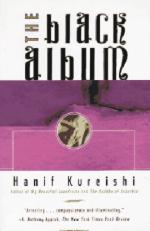
|
<%-- Page Title--%> Book Review <%-- End Page Title--%> |
|||||||
|
<%-- Volume Number --%>
Vol 1 Num 124
<%-- End Volume Number --%>
|
|
September 26, 2003 |
||||||
|
<%-- Navigation Bar--%>
|
Five years on from The Buddha Of Suburbia, Hanif Kureishi's second novel treads carefully across the dangerous ground of young Asian identity, Islamic fundamentalism and the plight of his friend Salman Rushdie
The
Black Album ‘I am an Englishman born and bred, almost,' Karim Amir's opening declaration in The Buddha Of Suburbia, finds an echo in Hanif Kureishi's new novel, The Black Album. When its hero Shahid Hasan is embraced by an Asian Muslim as a 'fellow countryman', his reply is: 'Well... not quite.' The heroes of these
two novels separated by five years - The Buddha Of Suburbia, a Whitbread
prize winner for best first novel, and adapted as a BBC television serial
- share not only quizzical cultural 'inbetweenness' but adolescence.
Both want to escape the south London suburbs to a metropolitan Eden
of sex, drugs and pop. But the world has moved on since the 1970s. Punk
has given way to raves, the Berlin Wall is crumbling, and the fatwa
against Salman Rushdie is being chiselled in stone. Set in 1989 among south Asian students at a college in Kilburn, north London, the novel shows Shahid wavering between an affair with his college tutor, Deedee Osgood, and an increasingly militant Islamic group. Neither Rushdie nor The Satanic Verses is named in the novel, but the references to 'the author of Midnight's Children' are not veiled. 'The book was never intended to be about Salman or the Rushdie affair,' Kureishi says. 'I wanted it to be about the issues that interested me at the time of the fatwa. But the interest started because this thing happened to my friend.' Kureishi speaks of Rushdie as a mentor. He was among the first to mount platforms against Ayatollah Khomeini's death threat. But Kureishi, of a Bombay Muslim father and English mother, who describes himself as from a 'Muslim background, but not in the religious sense', approaches the 'fundamentalists' with sympathy. It also offered
a shield. The novel draws the link between Muslim militancy in Britain
and the racism it arose partly to combat. As a boy, Shahid wanted to
join the British National Party('I would have filled in the forms -
if they have forms'), thinking: 'Why can't I be a racist like everyone
else?' Kureishi, whose schoolmates were skinheads, and has said he always
imagined himself to be a white kid, says: 'I wanted a picture of a bloke
going mad with an identity crisis. He was so fucked up he wanted to
join the National Front. His father has died, his brother's a junkie,
he's looking for something. That was the springboard for his joining
the fundamentalist group.' The publishers had the novel read by advisers. 'I was careful not to do anything blasphemous- I wouldn't want to,' Kureishi says. 'And it's quite different to Rushdie's book. He wrote a book about religion; mine's about what people might do in its name. I'm not interested in the spiritual, but in religion as ideology, as a system of authority, a kind of business. It's important we ask questions: what are they doing with their money, with young people?' Deedee, meanwhile, between lectures on black history framed by Jimi Hendrix and Marvin Gaye, offers sex, all-night raves and Ecstasy. 'The book was a celebration of something I like about London - the pubs, clubs, and streets. I come from the suburbs; I'm still fascinated by that,' Kureishi says. 'The sensuous life of Deedee Osgood and the world of art are related... She'd been apolitical fundamentalist Trotskyist when the wall starts crumbling and she doesn't know where she is any more. She opts for a liberalism that becomes Thatcherite; she wants to enjoy her body, take drugs and have a good time.' Yet Shahid opts for Deedee, as the fundamentalists burn the offending text on campus, and Chad comes to a bad end firebombing bookshops. 'I didn't want to
write a book that took sides,' says Kureishi. 'I'm Through Dr Brownlow,
the cuckolded Marxist-Leninist who has been 'stuttering since Eastern
Europe began collapsing,' and Rugman Rudder, a Labour councillor, Kureishi
satirises what he calls the appeasing 'ideological contortions' of the
hard left, or of politicians who aim to 'help the Asian community out
of weird liberal decency'. Kureishi
is aware that not all-devout Muslims are fundamentalists, thugs or philistines,
and not all 'liberals' have embraced a multiracial Britain. My Son The
Fanatic, his short story for the New Yorker which he is adapting as
a BBC film, makes the point that the knee-jerk reaction against 'fanatical'
Muslims may take on its own fanaticism. Yet those are the polarities
in which the novel's 'argument' is staged, and from which Shahid makes
his choice. Source: The Guardian. |
|||||||
